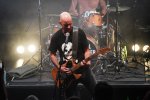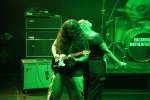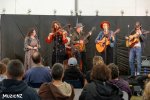The Datsuns - Death Rattle Boogie Album Review
 The Datsuns are one of those New Zealand bands who seem to have been around forever, churning out dirty garage rock, releasing well-received albums, but never seeming to do as well at home as they do abroad.
The Datsuns are one of those New Zealand bands who seem to have been around forever, churning out dirty garage rock, releasing well-received albums, but never seeming to do as well at home as they do abroad.
Their new album Death Rattle Boogie, the fifth the band has released, may go some way to address that problem. While it’s obviously the same band, right from opener Gods Are Bored, there seems to be an added energy and drive to the music. This may be a result of spending time apart, spread across the globe, or perhaps has more to do with singer Dolf’s recognition of the Datsun’s albums as a legacy to leave behind.
Whatever the reason, this is an easy album to get into and get hooked on. It’s going to appeal to long-time fans of the band, but should also attract new fans of raw buzzing guitars and pounding rhythms; rock and roll at its most pure. Because at its essence that’s what the Datsuns have produced in Death Rattle Boogie; it’s not music trying too hard to be technical or overawe the listener, rather it overpowers the listener with its primal rawness.
So if straight up, no nonsense rock that cries out to be played as loud as is what you’re into, then Death Rattle Boogie is going to be like Christmas come early for you.
View Track Listing
About The Datsuns

‘The narrative of Deep Sleep is this: we got together, we wrote some songs and we recorded them in the space of ten days,’ says de Borst, ‘It was basically an experiment to see if we could do it and this is what we got, for better or worse. We had this manifesto of ‘we have to do this fast, it needs to fit within these sonic parameters, and we want to keep it simple.’’
Their almost nuclear family-like existence changed around five years ago when the four members settled in separate cities. Singer/bassist Dolf de Borst put down roots in Stockholm, Sweden, building a recording studio with Nicke Andersson (The Hellacopters, Imperial State Electric); guitarist Christian Livingstone returned to London, embracing the ways of a mad fuzz scientist and birthing his own FX pedal company, Magnetic Effects; guitarist Phil Somervell returned from Germany to Auckland, New Zealand, continuing his work as a squash coach and dabbling with other musical projects; and drummer Ben Cole, based himself permanently out of Wellington working as a session musician and playing with The Joint Chiefs and the Craig Terris Band.
Visit the muzic.net.nz Profile for The Datsuns
Releases
Other Reviews By Alistar3000
 Primacy - Single Review: Shade Black
Primacy - Single Review: Shade Black
15 Oct 2015 // by Alistar3000
Auckland 5-piece Primacy are one of those bands that don’t try and hide their influences; their new single Shade Black is a healthy blend of all that was good about ‘90s rock, and that’s not a bad thing. Starting out with a Tool-like intro that soon gives way to a heavier, chugging riff, the song maintains a freshness and urgency throughout.
Read More...
 Cairo Knife Fight - Album review: The Colossus
Cairo Knife Fight - Album review: The Colossus
11 Jun 2015 // by Alistar3000
Having seen Cairo Knife Fight perform live many times over the past few years I’d always been under the assumption they were performing songs from a number of prior recordings. So I was a little surprised to discover that The Colossus was actually their first album (they do have a few EPs recorded), and more surprised to find that long time guitarist Aaron Tokona (AHoriBuzz) was no longer a key part of the band, and makes only a small appearance on the album – with that revelation I didn’t know what to expect when I pressed play.
Read More...
 Mel Parsons - Album Review: Drylands
Mel Parsons - Album Review: Drylands
05 May 2015 // by Alistar3000
Back in 2011 I reviewed Mel Parsons' second album Red Grey Blue and enjoyed it – it had some well written songs, was well produced, and was easy to listen to. When I first popped in her latest album Drylands, I thought she’d taken a bit of a different path to the alt-country that dominated her first album.
Read More...
 Album Review: Tahuna Breaks Live 10
Album Review: Tahuna Breaks Live 10
02 Apr 2015 // by Alistar3000
It’s hard to believe that Tahuna Breaks is celebrating 10 years making music together, although they do seem to have always been around, and I guess if anyone’s going to be keeping a record of how long they’ve been making their brand of funkified reggae, it’d be them. To celebrate the occasion they’ve release Tahuna Breaks Live 10 – 10 tracks spanning their career, recorded live last year at a one-off concert to celebrate the milestone (so I guess the album should actually be called 10 + 6 months).
Read More...
 State Of Mind - EP Review: Until The World Ends
State Of Mind - EP Review: Until The World Ends
12 Feb 2015 // by Alistar3000
Auckland drum and bass duo State of Mind are no strangers to collaboration, having worked with the likes of Tiki Taane and PNC to craft some big hitting tracks that achieved a lot of airplay. This time round they’re working with the trio from Black Sun Empire, hailing out of the Netherlands, produce the heavy hitting Until The World Ends EP together.
Read More...
 Album Review: Latinaotearoa in Latinoamerica
Album Review: Latinaotearoa in Latinoamerica
09 Dec 2014 // by Alistar3000
When I started reading about the concept behind the second Latinaotearoa album it sounded like a good idea and I was quite excited to have a listen to it. If you’re not familiar with the story, Auckland musician Isaac Aesili (Solaa, Opensouls, Eru Dangerspiel, Funkommunity) teamed up once again with Venezualan singer Jennifer Zea, and Brazilian-born DJ Bobby Brazuka, to research and write a bunch of songs in Brazil, then record the album of Latin-influenced tunes in Brazil and Auckland with guest appearances by some great musicians (such as Raiza Biza, Julien Dyne, Riki Gooch and Miguel Fuentes) – what should, on paper, lead to some great experimentation and crossovers of styles.
Read More...
 Beastwars Live at San Fran, Wellington 10/10/2014
Beastwars Live at San Fran, Wellington 10/10/2014
21 Oct 2014 // by Alistar3000
I was finding it hard to believe that it’d been over 18 months since I last saw Beastwars play in Wellington as I stumbled on down to the newly refurbished San Fran in Wellington last week. I’m not sure why it’d taken me so long to go back to Wellington’s number one metal (or at least heavy rock) band, especially since they’d never disappointed me before.
Read More...
 Into Orbit - Caverns Album Review
Into Orbit - Caverns Album Review
24 Aug 2014 // by Alistar3000
Wellington two piece noisemakers Into Orbit have an appropriate name for the kind of music they’ve created on their new album Caverns; it’s spacey feeling, often out there and is sure to take off. I wasn’t sure exactly what to expect from the album before listening to it (or even if I’d like it at all), but came away a devoted fan after having it on constant repeat for a couple of days while I explored everything it had to offer (I’m still not there yet, not even close).
Read More...
Most Viewed Artists
Latest Galleries
NZ Top 10 Singles
- APT.
ROSÉ And Bruno Mars - DIE WITH A SMILE
Lady Gaga And Bruno Mars - BIRDS OF A FEATHER
Billie Eilish - TASTE
Sabrina Carpenter - I LOVE YOU, I'M SORRY
Gracie Abrams - ESPRESSO
Sabrina Carpenter - SAILOR SONG
Gigi Perez - LOSE CONTROL
Teddy Swims - A BAR SONG (TIPSY)
Shaboozey - GOOD LUCK, BABE!
Chappell Roan

















 Report A Problem
Report A Problem

